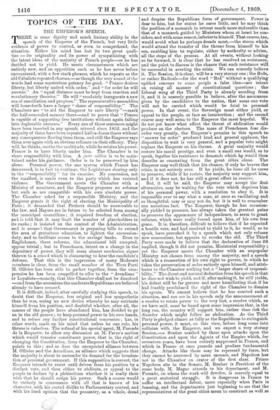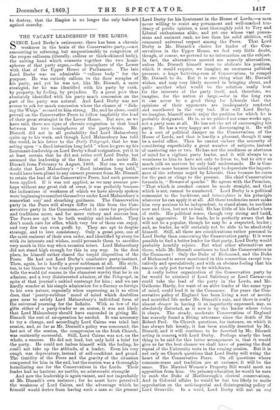TOPICS OF THE DAY.
THE EMPEROR'S SPEECH.
THERE is some dignity and much literary ability in the speech of the Emperor of the French, but very little evidence of power to control, or even to comprehend, the situation. Either his mind has lost its two great quali- ties — its originality and its power of sympathizing with the latent ideas of the majority of French people—or he has decided not to yield. He meets circumstances which are entirely new, and an opposition such as he has never before encountered, with a few stock phrases, which he repeats as the old Cabalists repeated charms,—as though the very sound of the words had some mysterious potency for good. " France desires liberty, but liberty united with order," and " for order he will answer." An " equal distance must be kept from reaction and revolutionary theories." He will "resolutely inaugurate a new era of conciliation and progress." The representative assemblies will henceforth have a larger " share of responsibility." The Chambers are " to aid the Emperor to save liberty "—mark the half-concealed menace there—and to prove that " France is capable of supporting free institutions without again falling into deplorable excesses." Every one of these sentences might have been inserted in any speech uttered since 1852, and the majority of them have been repeated half-a-dozen times without any consequences flowing from them, and still the Emperor says them over again with an obvious reliance on their efficacy. They will, he thinks, soothe the multitude, while he retains his power. France is to have liberty under him. The Chamber is to share responsibility with him. A juste milieu is to be main- tained under his guidance. Order is to be preserved by him alone. Personal power, the one system which France has denounced, is in fact to continue, the Legislature sharing only in the " responsibility " for its exercise. No concession, not the smallest, is made even to the party which has resisted violence. The Government meets the Chamber with a Ministry of nominees, and the Emperor proposes no reforms but such as are compatible with his own absolute power. The Chamber asked for a responsible Ministry, and the Emperor grants it the right of electing the Municipality of Paris ; it demanded that Prefects should be answerable to the law, and Mayors are in future to be selected from among the municipal councillors ; it required freedom of election, and is told that it may limit the number of placeholders in its ranks ; it insisted on the control of the Administration, and is assure 1 that Government is preparing bills to extend the area of gratuitous education, to lighten the succession- duty, and to facilitate access to the savings' banks. Even to Englishmen, these reforms, the educational bill excepted, appear trivial ; but to Frenchmen, intent on a change in the depositary of power, they will seem almost mockeries, cigars thrown to a crowd which is clamouring to hear the candidate's defence. That this is the impression of many Moderate members is clear, from the small number of the Tiers Parti M. 011ivier has been able to gather together, from the com- promise he has been compelled to offer to the " Arcadians or Loyalists—namely, that this Chamber shall not be dissolved —and from the accessions the moderate Republicans are believed already to have secured.
It is difficult, indeed, after carefully studying this speech, to doubt that the Emperor, less original and less sympathetic than he was, seeing no new device whereby he may extricate himself from his position, and doubtful whether, after all, the masses of the people have abandoned him, has decided to go on in the old groove ; to keep personal power in his own hands, and to refuse any further constitutional concession ; has, in other words, made up his mind that unless he can rule, his throne is valueless. The refusal of his special agent, M. Forcade de la Roquette, to allow any discussion on M. Favre's motion which would transfer constituent power, that is, the right of changing the Constitution, from the Emperor to the Chamber, points to this ; and so does the unexpected alliance between M. 011ivier and the Arcadians, an alliance which suggests that the majority is about to surrender its demand for the termina- tion of personal government. If this supposition is correct, the Emperor intends to resist until driven from his position by a distinct vote, and then either to abdicate, or appeal to the people to declare by a plebiscitum whether it is really their wish that he should resign his power. Such a course would be entirely in consonance with all that is known of his character, with his rooted dislike to Parliamentary control, and with his fixed opinion that the peasantry, as a whole, dread
and despise the Republican form of government. Power is dear to him, but for status he cares little, and he may think the position of a monarch in retreat much more endurable than, that of a monarch guided by Ministers whom at heart he con- siders, and with some reason, inferior to himself. That course, too,. would avoid what he perhaps dreads most,—the storm which. would attend the transfer of the throne from himself to his son, enabling him to regulate, either by authority or advice,. all the steps of the process. At all events, without looking; so far forward, it is clear that he has resolved on resistance, and the point to discuss is the chance that such resistance will be successful in averting the crisis. We can scarcely believe it. The Session, it is clear, will be a very stormy one ; the Reds, or rather Radicals—for the word "Red" without a qualifying epithet conveys to some people a false idea—are intent on raising all manner of constitutional questions ; the Liberal wing of the Third Party is already seceding from it, and it is scarcely possible to believe, after the assurances given by the candidates to the nation, that some one vote will not be carried which would be fatal to personal power. In that event, the Sovereign must either yield, or appeal to the people, or face an insurrection ; and the second course may well seem to the Emperor the most hopeful. We do not yet know what effect the threat of abdication would. produce on the electors. The mass of Frenchmen fear dis- order very greatly, the Emperor's promise in this speech to "answer for order" produced loud and general applause, the disposition to wait is very general, and a popular vote might replace the Emperor on his throne. A great majority would restore his moral prestige, and even a small one would, so to speak, legalize his resistance to demands which hp would then describe as emanating from the great cities alone. The Emperor may well think that his chance, if only he braves the crisis, is not entirely over. If he yields, he loses all he cares to preserve, while if he resists, the majority may support him, and if it does not, he has still a great effort in reserve.
But, it will be said, the Emperor may accept the first alternative, may be waiting for the vote which deprives him of his personal power, with a resolution to obey it. It is impossible ever to say what a man, at once so vacillating and so thoughtful, may or may not do, but it is well to remember one notorious fact. The Emperor, though he has occasion- ally yielded to pressure, has always taken the greatest pains to preserve the appearance of independence, to seem to grant reforms, which were really forced upon him, of his own free grace. It is, therefore, difficult to believe that if he expected a hostile vote, and had resolved to yield to it, he would, so to speak, have provoked it by a speech which not only refuses new concessions, but appears to revoke the old. The Third Party were made to believe that the declaration of June 28• implied, though it did not promise, Ministerial responsibility ; yet the Emperor meets the Chamber with an unpopular Ministry not chosen from among the majority, and a speech which is a reassertion of his own right to govern, in which he takes the preservation of order entirely upon himself, and attri- butes to the Chamber nothing but a " larger share of responsi- bility." The direct and natural deduction from his speech is that he does not wish to yield, and if, after making it, he still yields, his defeat will be far greater and more humiliating than if he had frankly proclaimed the right of the Chamber to dismiss his agents. We cannot believe that he has courted such a situation, and can see in his speech only the announcement of a resolve to retain power to the very last, a resolve which, as we have said, must be based upon some impression that, in the long run, the country will support him, rather than risk the disorder which might follow an abdication. As the Third Party is pledged almost as fully as the Republican to extinguish personal power, it must, on this view, before long come into collision with the Emperor, and we expect a very stormy Session,—a Session marked by those open attacks upon the Constitution and upon the Agents of the Empire which, for seventeen years, have been entirely suppressed in France, and which in France at once precede and produce fundamental change. Attacks like these may be repressed by force, but they cannot be answered by mere menace, and Napoleon has not in the Chamber an orator of the first class. Prince Napoleon sits in the Senate, M. Rouher is President of the same body, M. Magne attends to his department, and M. Forcade, on whom the work will devolve, is scarcely equal to a great oratorical struggle. It is dangerous in France to suffer an intellectual defeat, more especially when Paris is foaming, and the departments just beginning to see that the representatives of the great cities mean to construct as well as
to destroy, that the Empire is no longer the only bulwark against anarchy.



































 Previous page
Previous page